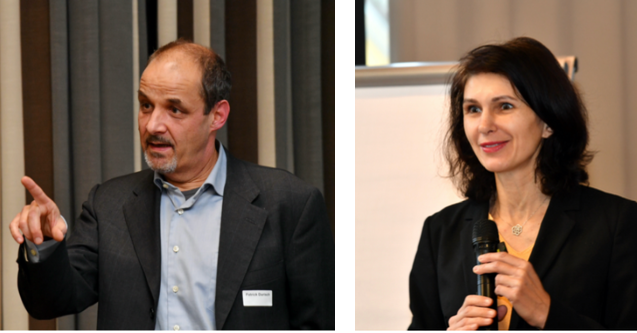Pharma Powerplay Rises Healthcare Costs
Red. Der Schweizer Klub für Wissenschaftsjournalismus SKWJ wollte Antworten zu folgenden Fragen: Neue Gentherapien wie Glybera oder Kymriah haben schwindelerregende Massstäbe bei den Behandlungskosten gesetzt. 370‘000 Franken soll die Kymriah-Infusion mit CAR-T-Zellen von Novartis gegen eine bestimmte Form von Leukämie bei Kindern und Jugendlichen kosten.Wie berechnen Pharmakonzerne solch horrende Preise? Sind sie gerechtfertigt, angesichts der Tatsache, dass die Grundlagen der Therapien aus der akademischen Forschung stammen und mit Steuergeldern finanziert wurden? Wie gehen Krankenversicherer mit dieser neuen Kostendimension um? Darf man die Prämienzahler mit solchen Therapiekosten belasten oder steuern wir auf eine Zwei-Klassen-Medizin zu? Könnte man so hochpreisige Therapien günstiger raubkopieren? Christian Bernhart fasst einschlägige Referate eines SKWJ-Seminars von Anfang Dezember 2019 zusammen.
In the traditional entrance lecture at the eve of the seminar, Patrick Durisch from the NGO Public Eye made the provocative statement that pharma groups abuse their monopolistic position to dictate the prices deliberately, especially the prices of orphan and cancer drugs. Durisch corroborated his observation with statistical figures such as the increase of drug costs between 2010 and 2018. They went up from 5,23 billion to 7,6 billion Swiss francs. Which signifies a rise in costs of 46 %, whereas the total healthcare costs of the same period increased by 27 %. He pointed out the fact that half of the increase of the drug costs was due to new cancer drugs with the sum of 1,14 billion Swiss francs. Durisch went on to explain how patents are seemingly being abused as a means to shut out competition and serve as a cash cow. Herein he referred to Roche’s cancer drug Avastin, that claims 219 patent applications, is on the market since 2004 and is blocked from competition for 43 years. The price of Avastin mounted 16 % in five years from 2012 till 2017. Further examples see here.
Novartis finally succumbed to Public Eye
Furthermore, Durisch focussed on the new cancer drug Kymriah (Novartis) against Leukaemia (370’000 Swiss francs for a single lifetime drug application benefitting from the patient’s blood cells which are genetically modified before being returned to the patient’s body). As was made known last summer, Public
Eye and Médecins du Monde have intervened at the patent-office in Munich against this patent, arguing that it lacked novelty, that serious side effects had occurred and above all that Novartis didn’t develop the drug but bought it.On 16 December Public Eye reported that Novartis dropped the Kymriah patent.
Veterinarian Durisch who has a Master of Advanced Studies in Public Health from the University of Geneva referred to several other studies published in Science, British Medical Journal or Lancet to highlight the fact that the pharma profits to a large degree of pubic funded research.See: «Government-funded research increasingly fuels innovation» and «Contribution of NIH funding to new drug approvals 2010–2016»
Stricter criteria for patents
Finally, Durisch pleaded for enforcing the World Health Assembly’s resolutions and for benefitting from the option of compulsory licensing instead of sticking to patent owner restrictions. He advocated for applying higher patentability criteria and for breaking the strong link between the high costs arising for patent owners for their R & D and the medical prices.See: «Delinkage.org»
To achieve these goals Switzerland should join its efforts with other states. According to Durisch, the endeavour should be directed towards more transparency and fairer prices. In the introduction of his lecture, he quoted the following conclusion by Pascal Strupler, who came up with it after having been at the head of the FOPH for 20 years: “Le manque de transparence est regrettable”, a quote in Le Temps of August 26, 2019.
Calamitous politicians and pharma leader symbiosis
Valérie Junod, honorary professor of the Department of Business and Tax Law at the University of Lausanne and in the Department of Commercial Law at the University of Geneva showed her detailed knowledge about the entangled rules and laws of the Swiss health legislation. She depicted a situation in which pharma enterprises easily evade a price-setting by introducing different price tags, which are often not transparent, such as Public price, ex-factory price, distribution margins, prices of original list of specialties (LS) drugs, prices of generic and biosimilar LS drugs, or even drugs not on LS according to health insurance ordinance article 71 a –71 d, which allow access to high-priced drugs in special cases though they are not yet included in the LS. She doubted that the efforts suggested by Durisch would succeed. Having experienced how the economic leaders and politicians are symbiotically connected, she advocated that drugs bought abroad should be reimbursed (living in Geneva herself, she buys them in France much cheaper), or that the franchise of the healthcare tax should be based on revenue. I perceived in her speech, which often went along with ironic laughter, that she was quite disillusioned with the weak laws that are supposed to fight high medical prices. She proposed some possible remedies such as a ban for pharmaceutical companies from receiving public funds or the introduction of specific funds to cover high priced drugs. Her answer to the sludge in which the health system got stuck is: “It’s complicated simply because it’s political” and “It’s the economy, stupid”. So, since Clinton’s presidential election of 1992 no progress has been made.
Implausible ex-factory prices
It was Simon Wieser who somewhat differently interpreted the rising drug costs. As a professor of economy at the Zurich University of Applied Science in Winterthur in Health Economics he declared that his institute is also mandated by the government, health associations and the pharma, but that his income from such mandates outside of his work as a professor is donated to charities. Presenting a chart of patented drug ex-factory prices of nine European countries, he made evident that they vary remarkably, being 23 % cheaper in France than in Switzerland due to discount agreements. Focusing on the high-priced orphan drugs Wieser argued that they might be justified if they guarantee better health outcomes, especially if they help to reduce nursing costs. Unfortunately, there doesn’t exist a unanimous opinion about how man QALYs (quality-adjusted life-years or additional life years in good health) new drugs should guarantee.
Combination therapies as cost booster
Mathias Früh, chief of pharma and medical technology at Helsana, combed through the recent “Helsana Arzneimittel-Report” and came up with some critical conclusions, such as that Switzerland is not capable to profit from the cost- saving potential of biosimilars (generics), that the FOPH is buying drugs for more than 5,5 billion francs without asking the pharma to guarantee their value. Other points he made were that FOPH consents to margins which promote the sale of ever more expensive medications, that pharma propagates more and more combination therapies which do not keep their promises and that FOPH is too generous in allowing drugs to be used outside the SL-regulations according to article 71 a-d of the Health insurance ordinance. Früh argued for more transparency in medical regulations, above all in the SL approval process. Herein he shared the view given by Valérie Junod.
So, what can you do if the last chance to regain health is with an expensive orphan drug you cannot afford? Make the drug yourself or engage a freelance chemical engineer labouring in a garage or kitchen lab. See: «DIY drugs: should hospitals make their own medicine?»
Last hope in Frankenstein’s therapy
The way to this dangerous DIY (Do it yourself) gene therapies was presented by Andreas Stürmer. The Austrian bio-technologist from Linz with a master degree in biotechnology and environmental engineering had once founded a yoghurt-start-up which was laid down due to the CRISPR regulation of the European Union. He presented excerpts from videos which lent some insight into the experimental and risky proceedings by bio-experimentalists who either test the effect on mice, or, like the experimentalist Josiah Zayner, wouldn’t even hesitate to inject the self-made substances into their own bodies.
Stürmer didn’t go into his own CRISPR-experiment on Herpes-2 medication, since the point was to show how people who have a serious disease and are desperate for a cure turn to freelance bio-technologists in hope to get some remedy if the commercial drugs offered are beyond their financial means. Stürmer distanced himself from offering self-made gene-therapies but voted for magistral drug production as a middle way. For further activities by Stürmer.
Unequal contest between human life and prices
An ethical point of view was delivered by Susanne Brauer, who has a PhD in philosophy of the University of Chicago and currently heads the “Alte Anatomie – Forum für Medizin & Gesellschaft” of the UZH, university hospital Zurich and ETHZ. She is also a co-founder of the counselling-office Bauer & Strub.
Most of the points discussed before, the lack of transparency and the overrated patent protection came also under attack by Brauer who judged this behaviour unethical. Unlike some other ethicists she, fortunately, didn’t vaguely propagate to counterbalance different values, nor did she transfer the decision thereof to be taken by the society, but approached the problems from a clear standpoint. For her, it was clear that justice in the distribution of high-priced drugs is difficult to obtain as long as the prices are not transparent and fair.
And she argued that the rescue of a human life cannot be counterbalanced with a certain amount of money. She advocated for political solutions to solve the problem of patents, prices and reimbursement.
Unjust high prices for generics in Switzerland
In the final plenary discussion, many of topics were raised again. The lack of decisive control instruments was accounted for the restrictive attitude of the government to interfere in the private sector, as Durisch put it. In order to push research on antibiotics, there are now different strategies discussed, but Wieser could not explain why European countries do not band together in this effort. “It is a powerplay”, summarized Durisch the actual situation of the health care system, where the pharma holds the upper hand. “Ideally all the good medicines should be in the LS, but that is not the case because the prices are so high.” As a way out Durisch claimed: “Assuming we could find a way of balancing this power play, maybe we could have cheaper drugs in the list of specialties and avoid the situation of art 71.” The question if increased competition on the drug market might help to reduce prices was somehow refuted by Mathias Früh: Competition by biosimilars doesn’t seem to work in Switzerland. He pointed out that they cost much more in Switzerland than in other countries. Here, one could establish an international reference price. According to Früh, the FOPH holds a proposal into this direction, but nobody shares this interest.
Themenbezogene Interessenbindung der Autorin/des Autors
Christian Bernhart ist Journalist und Mitglied des SKWJ.









In Deutsch wäre nett